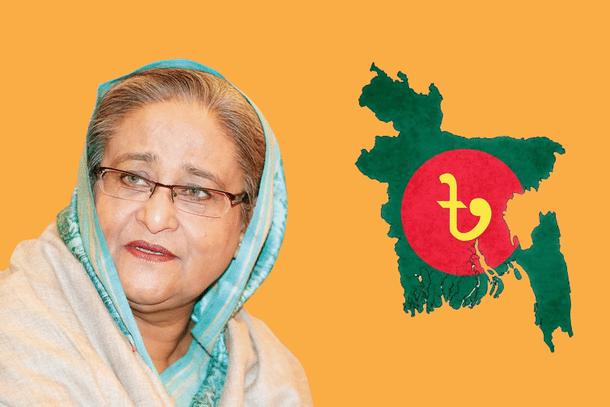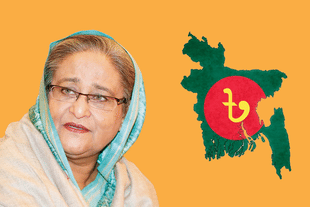Commentary
Why The Bangladesh Story Is Going Awry
Pratim Ranjan Bose
Dec 19, 2022, 05:20 PM | Updated 05:20 PM IST
Save & read from anywhere!
Bookmark stories for easy access on any device or the Swarajya app.


Aspirationally, the Gulshan area of Dhaka is Beverly Hills of the USA. The city’s politically-connected rich and mighty — who are widely blamed for rigging the financial system and siphoning wealth — have created a little piece of ‘foren’ for themselves, here.
With clean and green environs, specially-abled friendly pavements, top-notch shops and restaurants and, the classy architecture of apartments and bungalows — Gulshan looks better than the posh localities in many Indian metro cities, leave alone the congested downtowns of Dhaka.
However, take a short walk in any direction from the Gulshan-2 rotary and you will notice too many “To-Let” notices on properties. They are vacant. A clear sign of the slowing down of the economy and oversupply of pricey real estate. That was not the case before Covid.
With thinning foreign currency reserves, import restrictions, drop in demand for their virtually sole export item, readymade garments, from the key markets in USA and Europe, Bangladesh is in trouble.
The Covid-led global turmoil exposed the weaknesses of the economy. Before this however, Bangladesh grew manifold during the one-and-a-half-decade-long rule of the Sheikh Hasina-led Awami League government.
Exports grew three times and the India-China rivalry opened a floodgate of overseas loans and assistance to develop infrastructure projects.
The Making Of A Bubble
But, only one thing was missing. Bangladesh failed to undertake due structural reforms and strengthening of institutions to make the best use of the opportunity.
Cronyism which was always rampant in that country grew manifold. The result is now showing in the economy. (Read this)
The abundant source of funds did help Bangladesh create some shining infrastructure like the Padma Bridge. However, the astronomical unit cost of such projects makes one wonder if the cronies took away the cream. World Bank once dubbed it the “costliest” in the world.
The government cites techno-commercial hurdles for the high cost. But, people at large — from economists to Uber drivers — blame it on “unprecedented corruption.” Some people might have made merry at the cost of the rising debt servicing burden on the economy.
Between the fiscal year 2016-17 (FY17) and FY22, the country’s annual repayment (against past long-and-medium term loans) increased by 80 per cent to $2 billion. The repayment pressure will double in FY25.
Add to that the weak banking and financial regulatory system that made defaults and scams commonplace and there is a huge source of illicit finance.
It is believed that a good part of such illicit funds is siphoned off to other destinations. A recent Budget statement offered to regularise such finances if brought back to the country.
The rest of the illicit finances fluffed up the economy and the real-estate sector in particular.
The banking sector comes under dual regulation of the government and the central bank, opening floodgates for the politically connected to squander public money. The state-owned banks were already grasping for breath under the heavy pressure of sticky loans, for some time.
Now the private banks are also following that slippery path. In a recent case, Islami Bank, once a well-managed private bank, was found to have extended a big-ticket loan of over Rs 700 crore (Bangladeshi Taka 900 crore) to a fictitious borrower within 10 days of the loan application.
On 18 December, The Daily Star reported that only four private business families (who have substantial control over the nation’s financial sector) took away the majority of the lending by two banks.
The newspaper report was based on central bank data. The Prime Minister’s Economic Adviser Salman F Rahman’s name also features in the list of these influential borrowers.
Bangladesh’s central bank also felt that such a heavy concentration of loans to a few borrowers was risky, but it didn't take any action.
Struggle Of Millions
The whole situation is structurally suited to benefit a few. At a time when the entire world followed tight money policy to combat inflation and align with the rate hikes of the US Fed, Bangladesh remained an exception.
Policymakers in Dhaka capped the bank interests at 6 per cent for deposits and 9 per cent for credit. The policy was continued even in the face of thinning foreign currency reserves, energy crisis, sharp (nearly 50 per cent) increase in the pump price of auto-fuel and high inflation.
The economy is paying a heavy price. Low interests, made the real return from bank interests negative. Deposit growth in banks suffered. But banks were forced to open purse strings to the influential, adding to the risk of defaults.
If banks suffer from weak regulation, the financial market suffers even more. Scams are commonplace in the nation’s underdeveloped stock market, which is affecting the growth of the mutual fund industry and other financial sectors.
The net result is: common citizens have a limited option to grow their savings other than investing in risky funds which take exposure in the non-transparent real-estate sector.
Take the case of Shaukat Ali (name changed) from Dhaka. Ali earns in the range of Rs 2,00,000 in Indian Rupees (INR) a month. He saves roughly Rs 60,000. Two-thirds of it is locked up in real-estate funds. Worse, his investments suffered heavy erosion during the prevailing economic crisis.
Considering the paucity of health insurance products, Ali runs the risk of cash shortage in the face of any medical emergency. That quality healthcare is either absent or exorbitantly costly (compared to India), makes him vulnerable.
The going became tougher for cab driver Md Sumon too. A few years ago, Sumon sold his family land in the Brahmanbaria district in eastern Bangladesh and set off for Dhaka to ensure a better future for two children.
He invested part of the money in stocks and banks and purchased a reconditioned Japanese car at Rs 10 lakh (INR) for cab services. However, the share market investments suffered. The real return from the bank was in the negative. Only cab services kept the family ticking.
On average, Sumon earns Taka 1,200 a day. The crawling Dhaka traffic is a barrier to increasing the earnings that sum up to roughly Rs 29,000 in Indian currency. After paying the house rent he is left with only Rs 17,000 to meet other expenses.
Considering the higher price for food and essentials in Dhaka, when compared to India, Rs 17,000 is a shoestring for a family of four. If you include the opportunity cost of the capital invested in the car (think in terms of EMI against loans), his cab service is a losing proposition.
To survive the vulnerability, Sumon is cutting down his expenditures. Ali is considering shifting to a smaller apartment to reduce house rent. And, that is adding a new dimension to the vulnerability of Bangladesh.
Vulnerability And The IMF Loan
The plummeting exports and the looming slowdown of the 16 million-people-strong domestic economy, are not only increasing the foreign currency risks and impacting the job market. It might also end up widening the revenue gap of the government.
All these have a bearing on the value of Bangladeshi currency vis-à-vis the dollar, which again will determine the affordability of imports. That Bangladesh is highly dependent on imports, including food, increases the risk perception.
Will the International Monetary Fund (IMF) bailout (in terms of IMF nomenclature its support, not a bailout) help Bangladesh tide over the crisis? The answer is tricky.
According to ITC Trade Map, Bangladesh imported goods worth $77 billion in 2021 at an average of roughly $6.4 billion a month.
The $4.5 billion IMF loan will come in seven tranches. The first tranche of less than $0.5 million will come in February. Theoretically, that’s peanuts. However, it should open the gates to getting more loans from other sources to shore up liquidity.
Any such arrangement will come at a cost. First, the loan requirement may rise, if the global recession intensifies. Either way, it is almost certain that Bangladesh has to face higher repayment obligations, than estimated, to survive the liquidity crunch.
The bigger risk is political-economic in nature. IMF loan comes with heavy conditionalities for reforms. No doubt such reforms are essential. But they will be painful.
Can Bangladesh do it in an election year? The election is due in end-2023. If they don't IMF will not release the next tranches.
Common people who are already facing the brunt will surely resist it. More importantly, such reforms may also not go down well with the select business groups who are now at the driving seat of the economy.
Over the last few years, the political administration of Bangladesh is almost hijacked by the business lobby. Roughly 80 per cent of the Parliament members are businessmen. The Finance Minister too comes from a top business family.
The crony capitalists, who made the most of the closed economy era, opposed the 1991 reforms tooth and nail.
Can Bangladesh be any different? Can Awami League afford it? They won a highly doubtful election in 2018 and are now hugely unpopular.





